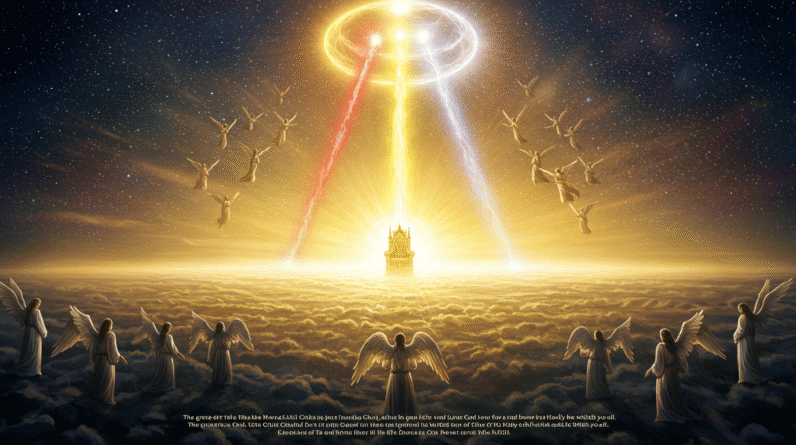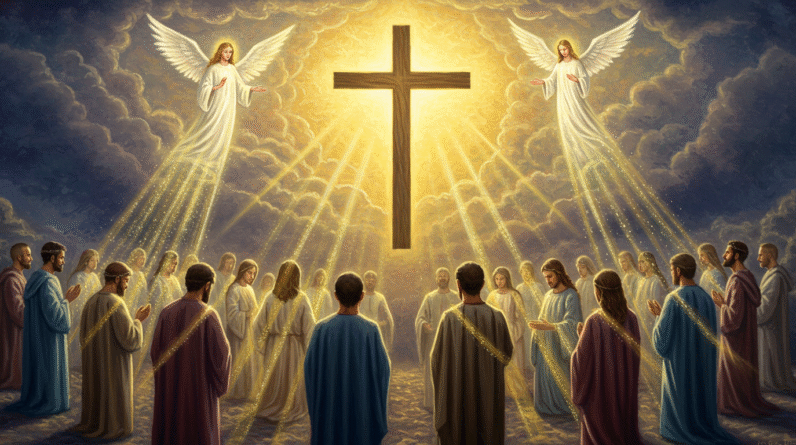The Father as Creator and Sustainer (1 Corinthians 8:6)
When you read 1 Corinthians 8:6, you meet a simple but profound statement: “yet for us there is but one God, the Father, from whom all things came and for whom we live” (1 Corinthians 8:6). In that brief clause you find two great truths about the Father: He is the Creator — the source of all that exists — and He is the Sustainer — the One for whom and through whom life continues. As you study this verse in the light of Scripture, you’ll see how the Bible unfolds the Father’s role within the glorious mystery of the Trinity: one God in three Persons, each distinct yet perfectly united in purpose.
You’re not simply exploring a theological abstraction. These truths shape how you worship, how you live, and how you understand the mission Christ has given you. When the Father is recognized as Creator and Sustainer, it changes the way you see your daily life, your trials, and your hope. Let’s walk through Scripture, history, and practical application so you can come away with a deeper, living conviction of who God the Father is and how His creative and sustaining power matters to you now.
What 1 Corinthians 8:6 is Saying — The Immediate Context
In 1 Corinthians 8:6 Paul is addressing a practical question: how should Christians relate to idols and the gods of the surrounding culture? He insists there is “but one God, the Father,” and that this God is both the source of all things and the goal of our living (1 Corinthians 8:6). This is Paul’s corrective to confusion in the Corinthian church; he grounds ethical behavior in the doctrine of God’s uniqueness and providential lordship.
As you read Paul’s words, you’ll notice he does not deny the reality of idols; rather, he reminds believers who their true Lord is. The Father is not some distant idea: He is “from whom all things came” — the origin of creation — and “for whom we live” — the final purpose and aim. That language echoes God’s creative work in the opening of Scripture and the theological claims that run like a golden thread through the Bible.
The Father as Creator in the Old Testament
From the very first verse of the Bible you see God the Father as Creator: “In the beginning God created the heavens and the earth” (Genesis 1:1). When you read Genesis, you are faced with the foundational truth that everything that exists has its origin in God’s will and word. The Father’s creative activity is not only powerful but purposeful: He creates order out of chaos and calls creation good.
The prophets and poets reinforce this. Isaiah asks, “Do you not know? Have you not heard? The Lord is the everlasting God, the Creator of the ends of the earth” (Isaiah 40:28). The Psalms praise God as Maker and Sustainer, celebrating how He established the foundations of the earth and set the seas in their place (Psalm 104:5-9). For you, these texts testify that your life and the world around you are not accidents; they are the design of a loving, personal Creator.
The Father as Sustainer in Scripture
Creation is not a one-time act followed by divine silence. The Bible continually emphasizes God’s ongoing care for what He made. You see this in Psalm 104, where God not only created life but sustains it by providing food and breath (Psalm 104:27-30). The psalmist reminds you that your very breath and the continuance of life are gifts from the Creator.
The writer to the Hebrews quotes God’s words to David, asserting the permanence of God’s creation: “In the beginning you laid the foundations of the earth, and the heavens are the work of your hands. They will perish, but you remain” (Hebrews 1:10-12). There is a sustaining faithfulness in the Father: He remains when all else fades. You can hold fast to Him because He is constant — the one who maintains what He made.
New Testament Witness: The Father, Source of All Things
The New Testament continues to point to the Father as the source. In John’s prologue you read that “through him all things were made” of the Son (John 1:3, but Paul clarifies the Father’s role as the ultimate origin in verses like the one in 1 Corinthians 8:6. Colossians sums up the full work of God in Christ, and yet it roots the cosmos in the Father’s purpose: “For in him [Christ] all things were created… all things have been created through him and for him” and then, closely linked, “He is before all things, and in him all things hold together” (Colossians 1:16-17. These verses present the work of creation and sustenance as the unified activity of the triune God. For you, that means creation finds its fountainhead in the Father’s will and purpose, with the Son and the Spirit involved in ordering and upholding what He has made.
The Trinity: One God in Three Persons — How the Father Relates to the Son and Spirit
When you try to think about the Trinity, resist the temptation to reduce it to a puzzle you must solve. The Bible gives you a picture: one God expressed in three distinct Persons — Father, Son, and Holy Spirit — who share the same divine essence and work together in creation and salvation. Paul’s statement in 1 Corinthians subtly reflects this. He names the Father as the source, and then he names the Lord (Jesus) as the agent: “yet for us there is but one God, the Father… and one Lord, Jesus Christ, through whom are all things and through whom we exist” (1 Corinthians 8:6).
This passage shows how roles are distinguished yet united. The Father is “from whom” — the originating cause. The Son is “through whom” — the mediator and agent by whom creation comes into being and is sustained. The Spirit’s role, as other passages show, is often represented as the present breath and power of God sustaining life and dissolving death (see Psalm 104:29-30). For you, this means that when you speak of God’s creative and sustaining work, you are speaking of the triunity of God in action — Father-origin, Son-agent, Spirit-power — yet one God.
Biblical Proofs of the Father’s Creative Priority
You may wonder: why emphasize the Father as “from whom” all things came? Scripture consistently points to the Father as the initiator of the divine plan. Paul tells the Ephesians, for instance, that God the Father “chose us in Him before the creation of the world to be holy and blameless” (Ephesians 1:4). Your salvation story is rooted in the Father’s prior love and purpose.
The Apostle Paul also says in Romans that “from him and through him and for him are all things” — a doxology that returns glory to the Father as the ultimate source and goal of all things (Romans 11:36). These verses reinforce the truth that the Father is not merely a title; He is the originating, purposeful heart of the divine will. When you pray, you’re entering into the ongoing work of the One from whom all things come.
The Father as Goal: For Whom We Live
Paul doesn’t stop at the Father as source; he calls believers to live for the Father — “for whom we live.” This has ethical and eschatological implications. Living for the Father means your life is oriented toward the One who made you and sustains you. It means your daily choices are not neutral; they either bring you nearer to the heart of God or they pull you away.
Jesus taught this orientation in the Lord’s Prayer, where you begin with “Our Father in heaven, hallowed be your name” (Matthew 6:9. Your worship and your life should bring honor to the Father. Likewise, the doxology in Revelation leads the redeemed to worship the One who “created all things” and for whom everything exists (Revelation 4:11). When you align your life with the Father’s purpose, you participate in the ongoing mission of God.

Creation, Providence, and Your Daily Life
Understanding the Father as Creator and Sustainer is not just for head knowledge. It changes how you view providence — God’s continuous action in the world. Acts records Paul’s sermon in Athens, where he explains that God “gives all men life and breath and everything else” and that “in him we live and move and have our being” (Acts 17:25,28). When you face uncertainty, pain, or loss, you can rest in the truth that the Father is actively upholding you.
The Psalms often speak of God’s sustaining care in the small details of life. “The eyes of all look to you, and you give them their food at the proper time” (Psalm 145:15). You have a God who notices, who cares, and who meets needs. This is the comforting aspect of the Father’s sustaining role: He is intimately involved in what concerns you.
The Father’s Sovereignty and Your Responsibility
Scripture balances divine sovereignty and human responsibility. Knowing the Father is Creator and Sustainer should not lead you to passivity. Rather, it should motivate active obedience. The apostle Paul calls believers to conduct themselves “as those who are under authority” because God is the ruler over all (Romans 13:1). Your choices matter because they reflect the reality of the God who made and maintains the world.
Moreover, the Father’s sustaining care often comes through human means — your neighbors, your community, systems of provision. God’s providence can include the kindness of others, and He invites you to participate in sustaining one another. In this way, God’s creative and sustaining purposes are carried out through you.
The Father, the Son, and Redemption — Creation Reclaimed
When you think about the Father as Creator and Sustainer, you cannot separate that from the work of redemption in Christ. The very One who created the world enters history to restore it. John’s Gospel makes this personal: “For God so loved the world that he gave his one and only Son” (John 3:16). The Father’s giving is an extension of His creative love — He desires the flourishing of His creatures and will go to any length to redeem them.
Paul’s hymn in Colossians connects Christ’s reconciling work to the cosmic order: “For God was pleased to have all his fullness dwell in him, and through him to reconcile to himself all things” (Colossians 1:19-20). Your redemption is part of God’s plan for the whole creation — the Father’s desire to bring all things back under Christ. This is comforting because it says your salvation is not a private matter but part of God’s cosmic restoration.
The Father and the Holy Spirit: Sustaining by Power
The sustaining work of the Father includes the gift and operation of the Holy Spirit. Jesus promised that the Father would send the Spirit in the name of the Son to be your Helper and Advocate (John 14:26). The Spirit brings life, convicts of sin, and empowers believers for faithful living. In your daily walk, you depend on the Spirit’s sustaining presence to live in a way that honors the Father.
Paul also describes the Spirit as the one by whom God’s life is poured into believers. You experience the Father’s sustaining love when the Spirit renews your heart and strengthens your faith. The Trinitarian cooperation — Father as source, Son as redeemer, Spirit as life-giver — means you are surrounded by a divine work that begins, continues, and will ultimately perfect you.
Worshiping the Father Who Made and Holds All Things
If the Father is Creator and Sustainer, then worship is the natural response. Scripture invites you to “worship the Lord in the splendor of his holiness” and to give thanks to the One who “made the heavens” (Psalm 96:9; 146:6; https://www.biblegateway.com/passage/?search=Psalm+146:6&version=NIV). Your worship should reflect awe for the God who both made you and continues to uphold you.
Worship shapes your priorities. When you worship the Father, you declare that He is the source and goal of life. Music, prayer, and sacrament become not merely ritual but a participation in the reality of God’s creative and sustaining activity. You’re invited to bring your whole life — your talents, time, possessions — before the Father as an offering to the One for whom you live.
Pastoral Comfort: The Father in Suffering
The doctrine of the Father as Sustainer is especially precious when you suffer. You may feel abandoned or think God does not see your pain. Scripture assures you otherwise. The psalmist cries out, yet trusts that God is present: “You are my refuge and my shield; I have put my hope in your word” (Psalm 119:114). God’s sustaining presence is not a promise of painless life, but it is a promise that He is with you in the pain, upholding you.
Jesus himself taught you to pray to the Father who cares for the sparrows and counts the hairs of your head (Matthew 10:29-31). This is personal care from a sovereign Creator. When everything else seems to fail, you can cling to the Father as your refuge and the One who will complete the work He began in you (Philippians 1:6).
Practical Applications for Your Life
Knowing the Father as Creator and Sustainer should shape your daily living in practical ways. First, it grounds your identity: you are made by God and for God. Second, it informs your ethics: you live for the One who made you, which shapes your priorities toward love, holiness, and compassion. Third, it empowers your hope: the One who began a good work will bring it to completion.
Practically, you can cultivate a life of gratitude, steward your resources as gifts from the Creator, engage in creation care as an act of worship, and serve others as a means through which God’s sustaining kindness flows. When you face decisions, ask whether they honor the One for whom you live.
The Church’s Mission: Reflecting the Father’s Creative Heart
The church participates in the Father’s mission when it proclaims the gospel, cares for the poor, and seeks justice. The Father’s creative heart delights in flourishing and order; when the church works toward reconciliation and restoration, it echoes the Father’s purpose. Jesus prayed that those who believe might be one so the world may know the Father sent Him (John 17:21). Unity, mission, and love are ways you reveal the Father to a watching world.
Your mission, then, is not only to proclaim Jesus but to show people a Father who loves, provides, and sustains. Your evangelism and social action are two sides of the same coin: both flow from the Father’s creative and sustaining purpose for all creation.
Devotional Practices to Know the Father Better
To grow in your knowledge of the Father, adopt devotional practices that root you in Scripture and prayer. Start your day with the Scriptures that celebrate God’s creative and sustaining work — such as Genesis 1 or Psalm 104 — then spend time thanking the Father for specific gifts and provisions. Let the Lord’s Prayer (Matthew 6:9-13) shape your petitions.
You’ll also want to cultivate silence and listening. The Father often speaks through Scripture, through the Spirit, and through the face of a neighbor. Practice active obedience to what the Spirit prompts, trusting that the Father who began the good work in you will lead you on.
Common Questions and Misunderstandings
You might ask: Doesn’t saying the Father is “from whom” all things came imply subordination within the Trinity? Careful biblical nuance is required. Scripture distinguishes roles without dividing the divine essence. The Father, Son, and Spirit share the one divine nature; their relational distinctions do not mean inequality. Passages like 1 Corinthians 8:6 distinguish roles to help you see how God works in creation and redemption, without denying the full deity of each Person.
Another common worry is: if God sustains all things, why is there suffering? The Bible does not give a simple answer to the problem of evil, but it assures you that God is at work in suffering for a greater good — the redemption and refinement of His people and ultimately the restoration of all things (Romans 8:28-30). You are called to trust the Father even when you cannot see the whole picture.
Final Exhortation: Live for the Father
As you reflect on 1 Corinthians 8:6, let it move you to worship and obedience. The Father is the origin and the end; He is the One for whom you live. Let that truth shape your prayers, your ethics, and your mission. Bow before the Creator. Rely on the Sustainer. Share the news of the Father’s love with a world that desperately needs to know its Maker.
Remember Paul’s confident declaration: there is but one God, the Father, from whom all things came — and He is the rightful Lord of your life. Live accordingly, depend on Him daily, and let your life point others to the God who creates, sustains, and redeems.
Explore More
For further reading and encouragement, check out these posts:
👉 7 Bible Verses About Faith in Hard Times
👉 Job’s Faith: What We Can Learn From His Trials
👉 How To Trust God When Everything Falls Apart
👉 Why God Allows Suffering – A Biblical Perspective
👉 Faith Over Fear: How To Stand Strong In Uncertain Seasons
👉 How To Encourage Someone Struggling With Their Faith
👉 5 Prayers for Strength When You’re Feeling Weak

📘 Jesus and the Woman Caught in Adultery – Grace and Mercy Over Judgement
A powerful retelling of John 8:1-11. This book brings to life the depth of forgiveness, mercy, and God’s unwavering love.
👉 Check it now on Amazon
As a ClickBank & Amazon Affiliate, I earn from qualifying purchases.
Acknowledgment: All Bible verses referenced in this article were accessed via Bible Gateway (or Bible Hub).
“Want to explore more? Check out our latest post on Why Jesus? and discover the life-changing truth of the Gospel!”








